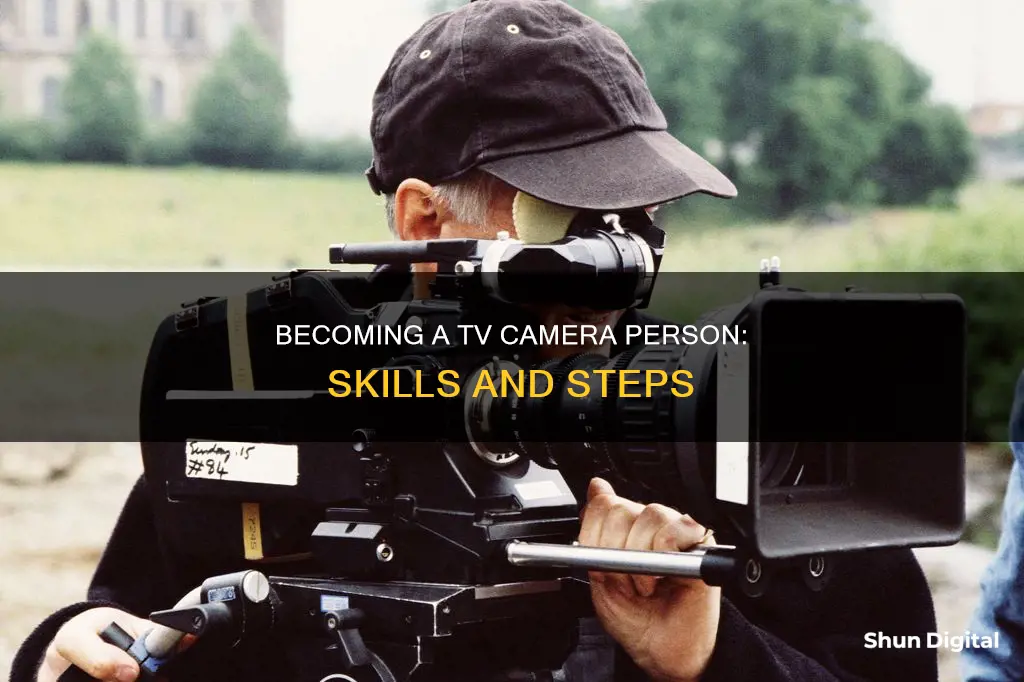
Working as a TV camera operator is a great way to break into the entertainment industry. Camera operators are responsible for capturing the action and bringing the director's vision to life. They work across various industries, including film and television, news broadcasting, sports, and music, and are always in demand. While a degree in a related field can be helpful, it is not always necessary. Aspiring camera operators should focus on gaining hands-on experience and building a strong understanding of camera equipment and technology. In addition to technical skills, camera operators also need good communication skills, physical stamina, and the ability to work well under pressure as part of a team.
| Characteristics | Values |
|---|---|
| Working hours | Can be more than 10 hours a day |
| Work environment | Studio or on location, sometimes in challenging conditions |
| Work equipment | Cameras, dollies, rigs, cranes, lenses, tripods, etc. |
| Work responsibilities | Leading a crew of camera assistants, mapping out visuals, assisting with blocking the set, getting cameras in position, framing the shot, supervising the selection and preparation of accessories, being in charge of the camera equipment’s movement and maintenance |
| Work tasks | Setting up and assembling equipment, discussing equipment requirements, capturing footage, operating the camera, adjusting the camera, monitoring equipment, consulting with other technical workers, supervising assistants, evaluating and selecting scenes, determining variables like lighting, shutter angles, camera distance, etc. |
| Work skills | Ability to work under pressure, collaboration skills, intimate knowledge of how a movie set operates, communication skills, hand-eye coordination, physical stamina, visual skills, artistic eye, technical knowledge of cameras, multi-tasking, concentration |
| Work challenges | Long hours, challenging conditions, low pay, heavy equipment, travel to remote areas |
| Qualifications | No formal qualifications required, but a bachelor's degree in film production, videography, photography, video production, creative arts, media, screen production, or film and television is advantageous |
| Salary | $33,442 to $113,608 per year, depending on experience and company |
What You'll Learn
- Camera operators need to be able to work under pressure, in a team, and take direction
- You must have an in-depth understanding of camera equipment and technology
- Good communication skills are essential when working with a production team
- Stamina and strength are required to carry heavy equipment for long periods
- A degree in film, media, screen production, or a related field is often required

Camera operators need to be able to work under pressure, in a team, and take direction
Camera operators need to be able to work under pressure, take direction, and work as part of a team.
Being a camera operator can be stressful. You may be required to work long hours, sometimes over 10 hours a day, and often under challenging conditions. You may be working on location, away from home for months at a time, and you'll need to be able to adapt to any problems that arise. You'll also need to be able to work well with others and take direction from the director, cinematographer, or floor manager.
A key aspect of being a camera operator is the ability to work under pressure. This pressure can come from long hours, tight deadlines, or challenging shooting conditions. For example, a camera operator might need to work in extreme weather conditions, such as a snowstorm or a desert, or in an uncomfortable environment like a freezing warehouse. They may also need to be available at a moment's notice, dropping everything and travelling to a remote location. This can be demanding, and operators must be able to handle these pressures while still delivering high-quality work.
Being able to take direction is also crucial for camera operators. They need to be able to follow the instructions of the director, cinematographer, or floor manager to ensure their work aligns with the creative vision of the project. This includes understanding and implementing feedback and making any necessary adjustments to their filming techniques, camera angles, or lighting setups. Effective communication skills are essential for this aspect of the role.
Additionally, camera operators must be able to work effectively as part of a team. Collaboration is essential in the film and television industry, and camera operators need to coordinate with various crew members, including producers, directors, camera assistants, grips, and gaffers. They must be able to take direction from supervisors, work together with other camera operators, and build good working relationships with their colleagues. This teamwork is especially important when working on multi-camera productions, where multiple camera operators need to work together seamlessly to capture the action from different angles.
In summary, camera operators need to possess a range of skills to excel in their roles. They must be able to handle pressure, take direction, and work collaboratively as part of a larger team. These abilities are essential for successful careers in the film and television industry, helping to ensure smooth productions and high-quality final products.
LG C9 TV: Does It Have a Camera?
You may want to see also

You must have an in-depth understanding of camera equipment and technology
To become a TV camera operator, you must have an in-depth understanding of camera equipment and technology. This includes knowledge of different camera types, such as 16mm and 35mm film cameras, digital video cameras, and cine-electronic television cameras. Camera operators need to be adept at selecting the appropriate camera and equipment for each shoot, including lenses, lighting, and other accessories. They must also be skilled in operating this equipment, adjusting settings like ISO, aperture, and shutter speed, and framing and composing shots.
Camera operators are responsible for setting up, positioning, and operating camera equipment, often in collaboration with a director or cinematographer. They may work with handheld cameras, cameras mounted on pedestals or body frames (Steadicam), or even drones. As such, they need to be familiar with a range of camera movement and stabilization techniques, including the use of dollies, rigs, and cranes.
Furthermore, camera operators should understand the artistic and aesthetic aspects of cinematography. This includes knowledge of different camera angles and movements and how they can enhance the tone and intention of a shot. Lighting is also a crucial aspect, as it greatly affects the overall look and mood of a scene. Camera operators often work closely with lighting technicians and may even be responsible for setting up lighting themselves. Understanding how to manipulate lighting conditions to achieve the desired effect is, therefore, an essential skill.
In addition to technical proficiency, camera operators must also possess strong communication and collaboration skills. They work as part of a larger film or television crew, taking directions from directors, cinematographers, or floor managers. Effective communication ensures that the camera operator can successfully execute the creative vision of the production. Camera operators may also provide their own creative input, suggesting camera angles or lighting setups that could enhance the final product.
Lastly, camera operators need to be adaptable and quick-thinking. On-set problems often arise, and camera operators must be able to troubleshoot and make adjustments on the fly. Whether it's dealing with equipment malfunctions, unexpected changes in shooting conditions, or last-minute creative decisions, camera operators need to remain calm under pressure and find solutions that ensure the shoot can continue without delay.
Activating Your LG Smart TV's Camera: A Step-by-Step Guide
You may want to see also

Good communication skills are essential when working with a production team
Effective communication is crucial for ensuring a smooth production process and achieving the desired results. Camera operators need to be able to adapt to different shooting styles and requirements, which often involves collaborating with multiple departments and individuals. For example, they may need to coordinate with the grips when setting up camera equipment and talk to the gaffers about lighting. They also work closely with the production designer, gaffer, and other crew members to bring the director's vision to life.
In addition to technical knowledge and skills, camera operators must possess interpersonal skills that enable them to work effectively as part of a team. This includes the ability to build positive working relationships with colleagues, adapt to different personalities, and manage the attendant stresses and compromises that come with working in a creative team. A good cameraman, for instance, must love people, according to TV cameraman Joel Shippey. He further states that it is vital to get along with others, as one may be stuck with 20 people in a desert for two months during filming.
Furthermore, good communication skills enable camera operators to provide clear instructions and direction to their own team of camera assistants. Camera operators often lead a crew of camera assistants, who assist with various tasks such as loading film stock, switching out filters, and handling equipment. Effective communication ensures that the camera team works cohesively and efficiently, contributing to the overall success of the production.
Lastly, strong communication skills can also help camera operators advance their careers and build a positive reputation in the industry. Networking and building relationships with professionals in the unscripted TV industry, for example, can open doors to new opportunities and collaborations. By effectively communicating their skills, knowledge, and expertise, camera operators can establish themselves as valuable members of the production team and gain recognition for their contributions.
Hacking Cameras: Watch Dogs Style Guide for Beginners
You may want to see also

Stamina and strength are required to carry heavy equipment for long periods
Stamina and Strength for a Career as a TV Camera Operator
Being a TV camera operator requires a lot of stamina and physical strength. You may need to carry heavy equipment for long periods, especially when filming on location. This can involve working long and irregular hours, including nights and weekends, and travelling to remote areas.
To prepare for the physical demands of the role, it is important to build up your strength and endurance. This can be achieved through regular exercise and training. Incorporating activities such as weightlifting or endurance training into your fitness routine can help improve your strength and stamina.
Additionally, it is essential to maintain a healthy diet and adequate sleep to support your physical health. Proper nutrition and rest will provide you with the energy and endurance needed to carry equipment for extended periods.
Another aspect to consider is the working environment. TV camera operators often work in a variety of conditions, including extreme weather, and may need to adapt to challenging terrain. It is crucial to be prepared for these conditions and to dress appropriately.
Furthermore, time management skills can help optimise your workflow and reduce physical strain. Efficiently planning and executing tasks can lessen the duration of equipment carriage, reducing physical exertion.
By focusing on building strength, endurance, and resilience, you can effectively prepare for the physical demands of a career as a TV camera operator.
Stream Zmodo PoE Cameras on Your Fire Stick
You may want to see also

A degree in film, media, screen production, or a related field is often required
A bachelor's degree in film, media, or screen production will provide you with the technical knowledge and practical skills needed to operate cameras and other equipment. These courses often cover topics such as camera types, lenses, lighting, sound equipment, editing software, and filming techniques. For example, you might learn about the differences between shooting on film versus digital, or how to use equipment such as dollies, rigs, and cranes. This technical knowledge is crucial for camera operators, who need to understand how different equipment choices can impact the final product.
In addition to technical knowledge, a degree can also help you develop the soft skills needed to be a successful camera operator. Communication and collaboration are essential in this role, as operators work closely with directors, producers, and other crew members to bring a shared vision to life. Degree programs often involve group projects and collaborations, allowing you to practice these skills in a realistic work environment.
Furthermore, a degree can provide you with valuable networking opportunities and industry connections. Many film and media programs are taught by industry professionals and can offer internships or work placements that give you real-world experience and help you build a network of contacts. These connections can be incredibly valuable when searching for entry-level positions and can sometimes lead directly to job offers.
While a degree is not always mandatory, it can certainly increase your employability and help you develop the skills and knowledge needed to succeed as a TV camera operator. However, it's important to note that the industry also values hands-on experience, so combining your degree with practical work placements or personal projects can further enhance your resume.
Insignia Smart TV Camera Capability: What You Need to Know
You may want to see also
Frequently asked questions
A bachelor's degree in a field related to film or broadcasting, such as communications, creative arts, media, screen production, or film and television is usually required. However, a degree is not always necessary, and some camera operators get their start as production assistants or with lower-level jobs within the camera department.
You need to have good communication skills, be able to work as part of a team, and accept direction. You also need to be able to work under pressure and have the stamina to work long and irregular hours.
TV camera operators capture footage for TV shows, news, documentaries, and more. They work with producers and directors to create the final production and are responsible for setting up, positioning, and operating camera equipment.
Salaries for TV camera operators vary depending on experience, company, and location. In the US, the average pay is $61,800, while the national average is $33,442. In the UK, a seasoned cameraman can earn between £300 and £400 a day, but you'll likely be earning minimum wage for the first few years.
TV camera operators often work long and irregular hours, including nights and weekends. They may need to travel to remote locations and work both indoors and outdoors.







